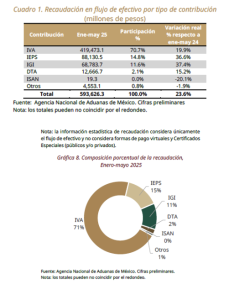
Foreign trade in Mexico has become one of the main focuses of attention in terms of taxation. According to the most recent tax collection trends, VAT accounts for more than 70% of tax revenues, followed by the IEPS.
As we all know the collection by the SAT has been increasing, and it is a practice that has been polished during all these years, the recent figures of the ANAM show us the considerable increase of the collection with respect to the previous year, recently the month of May was published as we can see in the following box:

In this context, the Master Control Plan 2025, presented by the SAT, sets a clear path; to tighten surveillance and compliance in customs operations, with special emphasis on companies with IMMEX programs and companies that are within the Integrated Certification Scheme for VAT and IEPS.
In recent months we have witnessed an increase in the cancellation of IMMEX programs, as well as an increase in the number of verification visits to certified companies, many of which have resulted in information requirements and even suspensions. This leaves us with a clear lesson: tax and customs compliance is no longer just a good practice, but a strategic element of business survival.
The Master Plan also confirms that it will continue with the use of technological tools to monitor and guarantee compliance with obligations and the detection of irregularities, these being more specific, leaving behind the broad and general audits that required the review of hundreds of pedimentos. Today, the selection of periods or pedimentos has been considerably reduced, obtaining a more effective result with a smaller number of pedimentos, all this due to the use of technological tools and techniques applied, which allow identifying errors and/or inconsistencies more accurately and in less time.
It should also be noted that the joint work with other agencies and collaborative agreements with the state have also contributed to the increase in revisions and, consequently, to their collection.
Faced with this new scenario, companies must ask themselves the following key questions:
We must remember that we have valuable or practical tools that we must implement in our daily lives to mitigate and reduce the risk of an imminent audit. Below, we will review some of them, I hope they will be of great use.
One of the main tools that is underutilized by many companies is the DATA STAGE, or gloss, which can be requested from the SAT, the procedure is very simple and has no cost.
This database allows detailed analysis of the pedimentos, and validate the existence of possible omissions or errors, this is a fundamental tool in the compliance area, which will help us to verify the traceability of our operations, as well as the timely detection of inaccurate data declared in pedimento, or perform an analysis of the correct use of incoterms and incrementable or decrementable declared, the correct use of identifiers, or even verify if the capture of fiscal data in the pedimentos was done correctly, as well as that of suppliers or customers, allows you to visualize if you have a correct tariff classification, or the proper application of the correct means of transport, no doubt you can generate a lot of reports that will help to detect and prevent errors that may be costing a lot.
It is also key to verify the foreign trade file of the imported fixed assets and to verify if the foreign trade file is complete, ensuring that the identification data such as make, model and serial number are the same. Many common errors in audits stem from lack of documentation or inconsistent records.
For all those companies that have an IMMEX program and a VAT and IEPS Certification, compliance with obligations is fundamental, as well as the correct inventory control of Annex 24, another strategic tool for the latter is the self-audit, where a physical inspection of the inventory vs. what is being captured in the system can be performed, this not only identifies errors, but provides a clear view of the current compliance. This not only identifies errors, but also provides a clear view of current compliance and would lead to adjustments or stricter measures to established procedures. In addition, it is vitally important to review the currency of the schedule 24 software, as well as the balances and expirations, and whether the seasonal dates are applied correctly, and to establish periodic reviews of bills of materials.
Foreign trade is certainly not an isolated area. In fact, its proper functioning depends on fluid communication with other areas, such as accounting, purchasing, logistics and systems. The lack of integration between departments is often one of the main risk factors in revisions. Therefore, good communication and teamwork would minimize the risks in the event of a review by the authority, would allow to analyze the risks currently faced and where to focus more corrective measures, collaboration between areas is essential, as well as the use of technological tools that generate operational efficiency.
The Fiscal Master Plan 2025 is not simply an administrative strategy: it is a strong signal of where fiscal policy in Mexico is heading, and makes it clear that foreign trade will be one of the main focuses of supervision. The use of technology, inter-institutional collaboration and intelligent data cross-referencing are revolutionizing the way in which the authority detects inconsistencies, omissions or possible acts of evasion.
The tax environment is changing, technologies are advancing, and authority is getting stronger. In the face of this, preparation, prevention and continuous improvement are no longer optional, they are business imperatives. Today more than ever, the best defense is a well-documented, well-managed and fully transparent operation.
The 2025 Master Plan is clear: there will be more oversight, more technology and less room for error. Prevention is our best ally. We have the tools, information and procedures that, if well
used, they can make the difference between a controlled audit and a costly sanction.
Today more than ever, preparation is not optional, it is mandatory.



